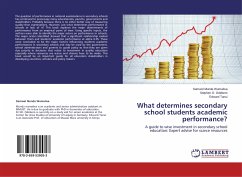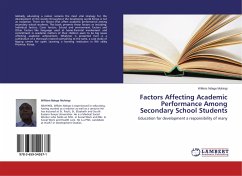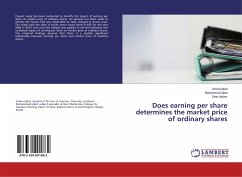The question of performance in national examinations in secondary schools has continued to preoccupy many educationists, parents, governments and stakeholders. Probably because there is no other better way of measuring quality than examinations. However, just what determines performance in schools or lack of it? This book explores the major determinants of performance from an empirical point of view. Using specific inputs, the authors were able to identify the major actors on performance in schools. The major actors identified showed that a significant relationship existed between them and students academic performance at alpha 0.05. These were concluded to be the major factors influencing students academic performances in secondary schools and may be used by the government, school administrators and parents to guide policy so that they are given due priority in decisions that relate to investment in quality education especially where resources are scarce and choices have to be made. This book would be an important guide for all education stakeholders in developing countries, scholars and policy makers.








